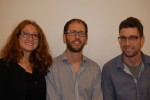Kara Mintzberg (B.C. regional director of CJPAC), Ron Laufer, centre, and Michael Schwartz. (photo from Jewish Museum and Archives of British Columbia)
With Canada’s 2015 federal election so closely contested, Jewish community organizations continued to the dying days of the long campaign to try to encourage volunteerism and interest in the electoral process. One such point of community engagement was the talk Observing Democracy by Ron Laufer on Oct. 8 at the Jewish Museum and Archives of British Columbia. Presented in conjunction with the Canadian Jewish Political Affairs Committee (CJPAC), the evening was a chance for people to hear about the challenging conditions under which elections run in a variety of countries around the world.
Laufer works as an election observer and administrator. He has administered private elections locally, in the case of court-ordered elections of nonprofit organizations such as the Guru Nanak Sikh Temple, for example. His international experience includes primarily work for the Organization for Security and Cooperation in Europe (OSCE). He has acted as an election analyst, polling station advisor and deputy head of mission for many international elections. Some of these elections were not particularly democratic while others, although complex in their execution, were perhaps surprisingly democratic in their process.
The Afghan election in 2005 was an example of a logistically complicated election. Not only was the concept of democratic elections new, but also a large proportion of the population is both illiterate and isolated in places unreachable by motorized vehicle.
“We used hundreds of donkeys, camels and horses to transport election materials,” said Laufer. The ballots were sometimes seven broadsheet pages on which voters needed to cast seven votes, no more, no less, in order for the ballot to be valid.
Laufer worked on this election on the ground in Afghanistan for six months in order to help educate the population, organize the ballots and the voting, and assess the results afterward. From the slides he showed, another challenge was keeping the election observers safe. “One trip included two international observers, with about 18 others between the interpreters and the security staff.”
Just a sampling of the countries Laufer has visited to help in some fashion with their elections includes Turkmenistan, India, Nigeria, Iceland, Hungary, Kosovo, Uzbekistan, Ukraine, Austria, Tunisia, Malta and Albania. With the exception of Nigeria, these countries are all member states of OSCE. Much of his work as an observer has been for the OSCE, since all member states are required to have observers of their elections. There are 57 states who have signed on to the OSCE, so this keeps Laufer quite busy, considering the length of his missions can range from one week to observe an election day to a long-term mission of up to six months.
Membership in OSCE is, in some cases, a screen for undemocratic states, such as Turkmenistan, and countries like Hungary and Bulgaria, which are becoming increasingly less democratic, said Laufer.
While he offered many examples of countries in which elections are no more than a show put on by the ruling dynasty, he also gave examples of countries whose systems seem to be improving. His fairly recent trip to Sierra Leone was a bright spot. He said, “They went through hell and back and now it feels like they are moving forward. Their election was fairly smooth.” He acknowledged that elections are only a small part of democracy but said that, without properly run elections, democracy cannot be achieved.
After Laufer answered questions from the floor, Michael Schwartz, JMABC coordinator of programs and development, gave a short presentation that was followed by Kara Mintzberg, B.C. regional director of CJPAC, who spoke briefly on the ways in which Jewish Canadians can “punch above our weight” in an election.
As a community, she said, we represent only 1.1% of the Canadian population and are spread out all over the country; only five percent of all ridings in the federal election were potentially influenced by a concentration of Jewish population in those areas. In general,
CJPAC encourages members of the community to volunteer, and facilitates the introduction of a volunteer who signs up with CJPAC to the volunteer’s choice of campaign, thus alerting the candidate to the participation and interest of a Jewish volunteer. This knowledge, it is hoped, will make the candidates more aware of the Jewish and/or pro-Israel presence and support in his or her riding.
Among CJPAC’s activities leading up to the Oct. 19 federal election was an all-candidates meeting on Oct. 1 at Beth Israel Synagogue with more than 500 in attendance. CJPAC’s mission of fostering Jewish and pro-Israel political leadership is not limited to election time.
For more information on the JMABC, visit jewishmuseum.ca. To become involved in political advocacy through CJPAC, visit cpjac.ca.
Michelle Dodek is a freelance writer living in Vancouver.

